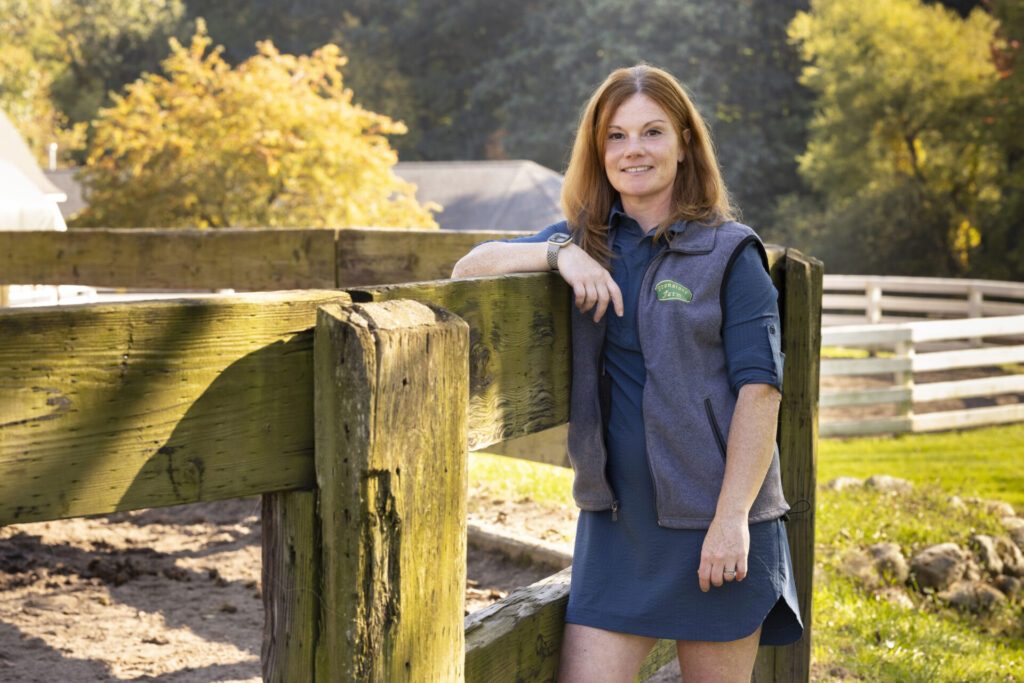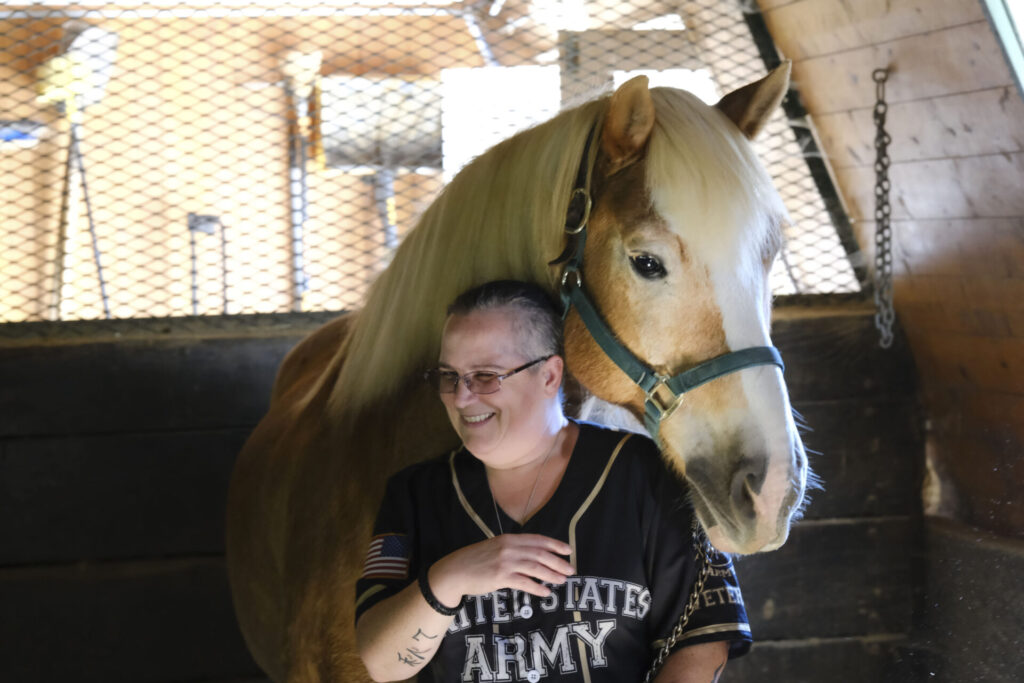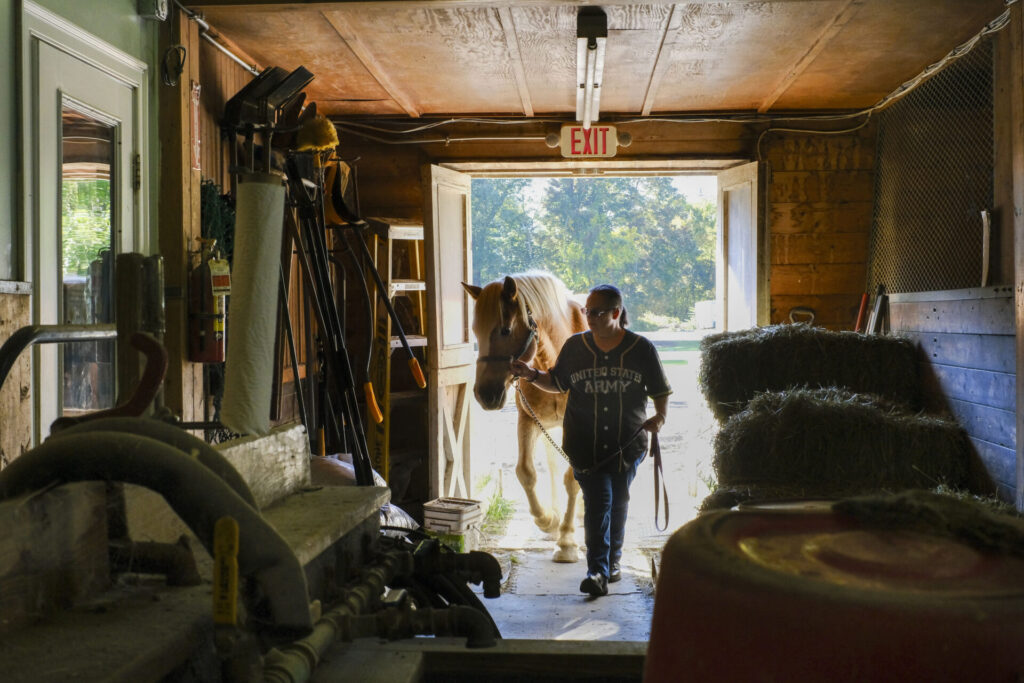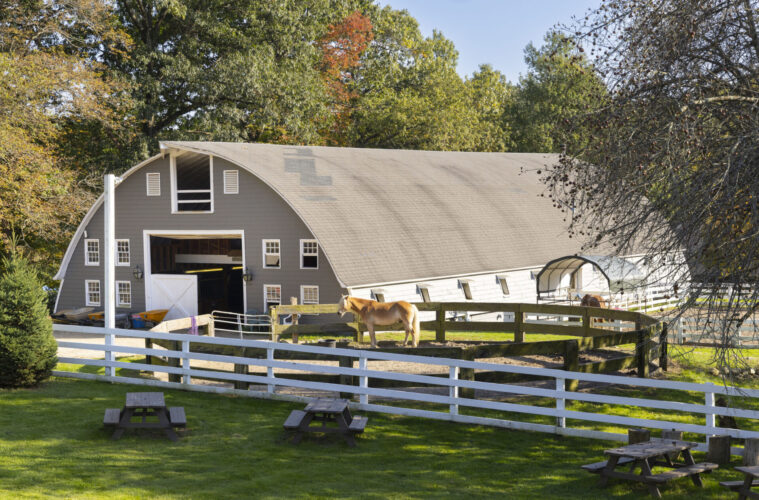Post-traumatic stress disorder (PTSD) is insidious, bringing with it an ever-present sense of danger and anxiety. “That’s one of the things with PTSD,” says Shauna Watts, an Army veteran from Franklin. “Always feeling like you have to watch out for what’s behind you . . . that heightened awareness.” Watts knows that feeling all too well. While she was serving in the military, she experienced several incidents of sexual violence, including being raped by her recruiter.
Now, she suffers from PTSD and is still working on living with the trauma that she experienced. But for one weekend in September, that all faded away. Watts and a group of fellow veterans visited Ironstone Farm in Andover for a weekend retreat with therapeutic horses. “That entire weekend, we all felt like we could have our guard down,” Watts said of the experience. “There was no anxiety.”
Ironstone Farm offers therapeutic riding and other equine-assisted programs for people with physical, cognitive, and emotional challenges, serving veterans and first responders living with PTSD, patients and families healing from and living with cancer, people in recovery, at-risk youth, and people living with memory impairment.

One of those programs is Ironstone Farm’s Veterans Experience, a free program which aims to use equine therapy to increase self-esteem, build trust, and reduce anxiety and isolation. Ironstone has been offering equine therapy on its 15-acre horse farm for 40 years and to veterans for 10 years.
Now, it’s also offering overnight retreats in its newly renovated, 12-bedroom, six-bathroom retreat center. The center is handicapped accessible, with ramp access from the parking lot to the front door, as well as a full bathroom and two bedrooms that are wheelchair accessible. “All the different people that we support and serve here . . . have the opportunity to stay overnight at the farm and experience a more immersive, impactful experience,” says Kerri Whalen, executive director at Ironstone Farm.
Among the groups who have taken advantage of those overnight retreats are veterans, who get to spend a weekend not only meeting, grooming, and riding horses, but also preparing meals together, playing games, watching movies, and sharing their stories and experience, all while creating community and camaraderie, Whalen says.

At the center of the experience, of course, is working with horses. Research has shown that equine therapy can help with everything from improving gross motor function to reducing anxiety, depression, and symptoms of PTSD. According to Whalen, “There is a very profound bond that happens between humans and horses. Horses are extremely intuitive animals,” she says.
“They often act as a ‘mirror’ in terms of being able to mirror what you’re bringing to the interaction.” Working with horses helps participants to build trust and rapport; be present in the moment; offer care to another creature; and improve their communication skills, including nonverbal communication and body language, among other benefits.
“I think that veterans often have difficulty trusting others, especially if they’ve experienced some kind of trauma, and horses provide a nonthreatening and nonjudgmental presence, allowing the veterans to build their trust and rapport with the animal,” Whalen says. “Horses are also very sensitive to our emotions, and veterans learn to control some of their emotions so that they can effectively bond and communicate with the horses. I think that’s especially beneficial for veterans that have conditions like PTSD.”

That was Watts’s experience. During her retreat with the organization Clear Path for Veterans New England, Watts worked with a horse, named Axel, that she described as a “spitfire” and that she got to ride bareback and share an incredible connection with. “He was very protective. I felt like he had my back. He was very in tune. The connection was there,” she says, adding that the horses are “very loving. You just look in their eyes and you just relax.”
Watts wasn’t alone. She witnessed the other veterans she was with connect on a deep level with the horses, even watching as one veteran who started the weekend quiet and reserved end up “chatting up a storm and relaxed. He was able to open up with other veterans by working with the horses,” she says. “Horses are very sensitive to your feelings, and that’s one of the things that’s great about therapy horses. We got to feel how the horses pick up on our energy, and feed off each other, and really that connection.”
After spending the weekend at Ironstone Farm, Watts says she made new friends, got a confidence boost, and reduced her anxiety. She also now wants to volunteer with the program itself. “It has been an amazing experience for us all. I can’t even express in words how much it has meant to all of us,” Watts says. “The program there is incredible, and I cannot stress that enough.”
Whalen gets to watch those changes happen again and again with different veterans that come to the farm. They get more relaxed, less anxious, more talkative, and more confident as the weekend goes on. “By Sunday afternoon, or even late on Saturday, you can see shoulders are back down, there’s smiles on faces,” she says.
450 Lowell St., Andover, 978-475-4056, ironstonefarm.org

